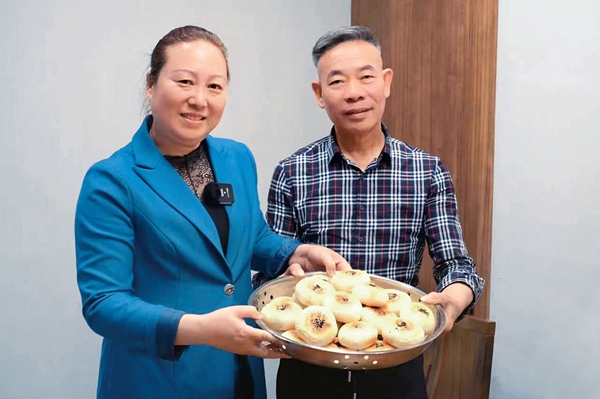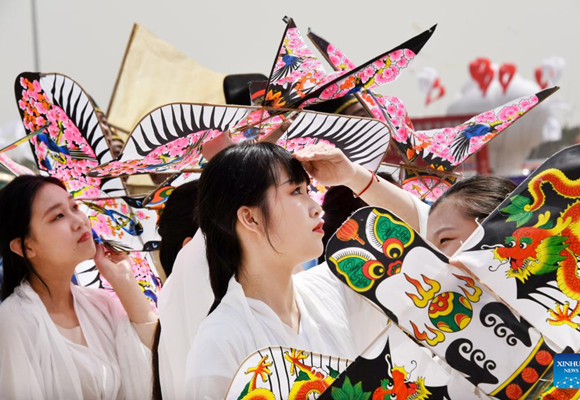Tough Choices for Chinese Students
Many Decide to Stay and Deal with Disease As They Continue Studying
On Jan 13, British Prime Minister Boris Johnson delivered a speech about his government's controversial approach to develop "herd immunity" against COVID-19.
Fu Chong, 31, a postgraduate student at King's College London, said Chinese students in the United Kingdom became nervous and even panicked after hearing the speech, with many considering returning to China.
"We hesitated over whether to go back to the motherland. We needed to make a really important decision quickly, but many of us had never experienced such an urgent situation," she said.
"We didn't have much time, as it became more difficult and expensive to buy air tickets."
Fu decided to stay in London. Many other students from China have also chosen to remain in the countries where they are studying. Their reasons include a desire to continue their studies, the risk of becoming infected on a flight and difficulty in obtaining air tickets.
Fu said Chinese students who chose to stay in London had organized WeChat groups for mutual help. She has joined several of the groups.
Students keep each other informed about the best places and times to go grocery shopping. Those living in the same building are exchanging supplies of necessities.
WeChat groups have also been organized for those who develop symptoms of the disease but are unsure if they are infected.
The Chinese embassy in London has provided students with health packs, which include medical kits and a guidebook on the pandemic. Fu has applied for a pack online.
She said some of her friends who have returned to China are due to graduate this year. They have disposed of possessions in their dormitories in case they do not return to London.
"Our problem is psychological — as the pandemic is spreading quickly in Europe, it's totally normal for many Chinese students here to feel anxious and unsettled," she said.
Confined voluntarily to her dormitory, Fu is using the time to concentrate on her homework and graduation thesis.
"My everyday life is much the same as before the outbreak, except that the university provides lessons online instead of in classrooms. I have enough to eat and drink, and use face masks for protection," she said.
"Some young British students used to pay little attention to the pandemic, but now they are taking it seriously."
Not everyone has been as fortunate as Fu. In the middle of last month, a Chinese student, surnamed Li, was taken to a London hospital by ambulance after having a high fever for four days.
She spent two nights in the hospital, took a test for COVID-19 and was discharged when her condition improved.
Li is now in good health. She was told that her test result would not be known for 48 to 72 hours, but after two weeks, she has yet to receive it.
As the ambulance took her to the hospital, she was shivering, coughing and finding it difficult to breathe. A doctor chatted with her throughout the journey, sharing his experience of infectious diseases. He even sang a song for her.
"His beautiful singing made me cry. It was the worst homesickness I had felt since coming to London, as I feared I may never see my family again," Li said.
In her ward, an electrical screen on the ceiling showed images of a blue sky. Li's pulse, temperature and blood pressure were monitored every 30 minutes.
Medical workers told her to drink water and eat as much food as she could. They also gave her paracetamol for her fever.
"I wanted to enhance my resistance levels, so I ate a lot of food, although I didn't want to," she said.
Li noticed that the nurses were extremely busy. They mostly treated elderly patients, some of whom found it difficult to move about.
"Through the French window in my ward, I could see that some of the nurses outside in the corridor were not wearing face masks or protective goggles. I was worried about their safety. They told me I must wear a mask when they entered the ward," she said.
Li was given free treatment, food and drink at the hospital.
"Only those with severe symptoms were sent there and tested. Once in the hospital, I felt much more secure," she said.
After Li shared her experience online, the Chinese embassy in London introduced her to two doctors. Chinese students who fell ill also contacted her for help, and she asked them to contact the doctors for advice.
In London, Li is majoring in risk and disaster reduction and has attended lectures on public health.
She said she has also studied the data for the outbreak of severe acute respiratory syndrome in 2003.
"The casualty figures are more than just numbers-there are many stories behind them. We need to learn how to cope with disaster," she said.
Aware of Severity
In Barcelona, Li Ruolin, 24, a postgraduate student at Pompeu Fabra University, burst into tears on learning that a European classmate had tested positive for COVID-19 in the Spanish city.
She said she was scared because of the potential risk. As a native of Wuhan, Hubei province, the epicenter, she is fully aware of the severity of the pandemic.
She contacted the Chinese consulate, where a staff member told her to get in touch again immediately if she developed symptoms. But two weeks of self-isolation at home ended recently with her in good health.
Since the middle of last month, Li Ruolin's university has suspended all classes. Most of her European classmates have returned to their home countries due to the worsening situation in Spain, where it is also the flu season.
She said that when she took a metro train to the university early last month, she heard many people coughing, adding that it had been almost impossible to buy face masks, as they were in short supply.
"The situation is very critical. More protective devices are needed for medical workers, who are under great pressure due to the soaring number of patients," she said.
When COVID-19 emerged in Spain in February, she wore a mask for grocery shopping, attracting stares from locals not used to such a sight.
"They think that only people who are sick need to wear a mask. But as the pandemic worsens, they are becoming aware of the importance of this," she said.
"The community where I live has many elderly residents, and I can sense that they are very worried about the situation."
Spain has enforced a national lockdown, with people only allowed to leave their homes for essential work, to shop for food, dog-walking, and for medical reasons.
Li Ruolin said supermarkets have limited the number of customers, with people forming lines outside keeping 1.5 meters away from each other.
The online vlogs she has posted about her life in Spain during the outbreak show that there are sufficient supplies of food and other daily necessities, but toilet paper is always sold out.
"Strict measures have been taken in Barcelona. Police are patrolling the streets to look for anyone violating the lockdown without a valid reason," she said.
Once, when she and her boyfriend were on the street with a heavy load of food they had just bought, a policeman told them that next time, only one of them should do the shopping.
She said the semester at many universities in Spain will end in June. Most classes are held in the afternoon or evening.
"My Chinese friends and I are staying in Spain because we're afraid that returning home may affect our graduation if we lag behind in our studies. In addition, air tickets are now very expensive," she said.
"I have mixed feelings about being overseas, but I'm happy that my family members in Wuhan are all healthy, so I only have to look after myself, and not worry about them."
Confined to Dormitory
In New York, the epicenter of the pandemic in the United States, Chen Ziwen, 24, has remained in his dormitory at New York University for more than two weeks. He has enough food to last for another month.
One of his classmates returned to China recently due to the uncertain situation in New York.
"Many Chinese students chose to return home because they were worried they would not be treated in time if they became infected. The number of patients has put an immense strain on the capacity of hospitals," said Chen, who is due to complete his postgraduate studies in econometrics in New York next month.
"Those who are going to graduate this year stand at the crossroads," he said.
Chen has found a financial job in New York. If he goes home to China, he risks being refused entry when he returns to the US.
Other reasons for his decision include the difficulty of buying an air ticket and the risk of becoming infected on the journey home.
The last time he left the dormitory was to shop for food.
"I was surprised to see that bread and bagels had all sold out. I just took it for granted that they would always be there when I went to the supermarket," he said.
He is now worrying over whether he will be able to buy more food after he has exhausted his supplies.
During the outbreak in China, delivery services have continued to operate, with community workers ensuring people receive food. But Chen said the situation is different in New York, as supermarkets have suspended such services.
When he wore a mask to attend classes in February, a US classmate thought it was part of his culture. But Chen said that many locals now know the importance of wearing a mask and staying at home as the pandemic spreads rapidly.
(Source: China Daily)
Please understand that womenofchina.cn,a non-profit, information-communication website, cannot reach every writer before using articles and images. For copyright issues, please contact us by emailing: website@womenofchina.cn. The articles published and opinions expressed on this website represent the opinions of writers and are not necessarily shared by womenofchina.cn.








 WeChat
WeChat Weibo
Weibo 京公网安备 11010102004314号
京公网安备 11010102004314号